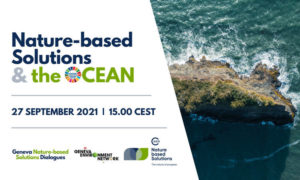Event Virtual
Nature-based Solutions and the Ocean | Geneva Nature-based Solutions Dialogues
The Geneva Nature-based Solutions dialogues aim to facilitate further engagement and discussion among the stakeholders in International Geneva and beyond, in the lead-up to a critical year for nature and society. The dialogues are convened by the Geneva Environment Network and the International Union for Conservation of Nature (IUCN). The Nature-based Solutions and the Ocean Dialogue was organized in the run-up to the 2022 UN Ocean Conference in Lisbon, Portugal.
About the Dialogues
We are facing a triple planetary crisis – climate change, nature loss and pollution. In this context, Nature-based Solutions (NbS) are a powerful ally to address a societal and environmental challenges. As per IUCN definition, NbS are actions to protect, sustainably manage and restore natural or modified ecosystems that address societal challenges effectively and adaptively, simultaneously providing human well-being and biodiversity benefits.
NbS are a powerful tool to facilitate and catalyse the engagement of cross-sectoral stakeholders to join forces towards the implementation of an ambitious Post-2020 Global Biodiversity Framework (GBF) and move towards achieving the CBD 2050 Vision of ‘Living in harmony with nature’. NbS also offer a pathway for synergies among several multilateral environmental agreements, including for biological diversity (CBD), climate change (UNFCCC), disaster risk reduction (Sendai Framework), desertification (UNCCD) and the wider Sustainable Development Goals (SDGs) – and for mainstreaming nature conservation into sectoral decision-making processes.
In the lead-up to a critical year for nature and society, NbS offer an opportunity to address a wide range of urgent societal challenges. The year 2021 and the major upcoming negotiations should indeed mark a turning point towards a resilient world for future generations.
Join the Geneva Environment Network and the International Union for Conservation of Nature in a one-year journey, where experts from all over the world and different sectors will discuss throughout the year how NbS are relevant to various debates ongoing in Geneva.
Sessions
- Nature-based Solutions and Health | 26 April
- Nature-based Solutions and Ecosystems Restoration | 7 June
- Nature-based Solutions and the Post-2020 Biodiversity Framework | 28 June
- Decent Work Through Nature-based Solution for an Inclusive Socio-Economic Recovery | 30 August
- Nature-based Solutions and Food | 13 September
- Nature-based Solutions for Building Resilience | 11 October
- Nature-based Solutions and Cities | 25 October
- Nature-based Solutions and Peacebuilding | 1 November
- Nature-based Solutions and Water | 22 July
- Nature-based Solutions and People | 6 December
About this Session
Covering more than 70% of the Earth’s surface, the ocean is essential to human lives and livelihoods. They directly support human well-being through food and energy resources, while stabilizing the climate and nurturing unimaginable biodiversity. However, pressures from human activities are degrading the ocean and destroying essential habitats (WOA II, 2021).
Nature-based Solutions can help reconcile the ocean and human activities. Indeed, well-crafted NbS can support the restoration and recovery of degraded marine ecosystems, while increasing economic and societal benefits. Examples include rehabilitating critical habitats such as seagrass and saltmarsh for biodiversity protection and carbon sequestration or managing coastal habitats to preserve biodiversity and protect people from extreme weather events.
As governments and other stakeholders prepare to meet for the 2022 UN Ocean Conference in Lisbon, Portugal, discussing the contribution of NbS to the sustainable management of the ocean is a timely issue. Co-hosted by Portugal and Kenya and originally scheduled for 2020, the conference will build momentum for scaling up science-based action to achieve the targets set in SDG 14: Life below Water. It will also harness synergies with the recently launched UN Decade of Ocean Science for Sustainable Development.
Ahead of this major event, this session highlighted the key role of NbS for preserving, restoring, and sustainably managing the ocean, while delivering benefits for people and nature.
Speakers
By order of intervention

Minna EPPS
Director, Global Marine and Polar Programme, IUCN | Moderator
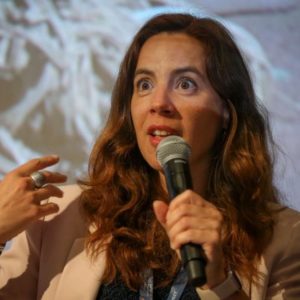
Helena VIEIRA
Director General of Maritime Policy, Ministry of the Sea, Portugal
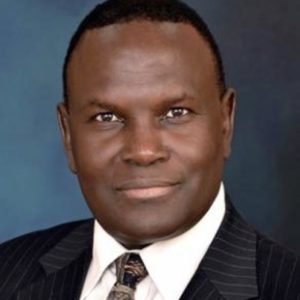
H.E. Amb. Cleopa MAILU
Permanent Representative of Kenya to the UN and other International Organizations in Geneva
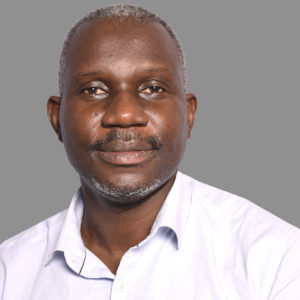
Arthur TUDA
Executive Secretary, Western Indian Ocean Marine Science Association (WIOMSA)

Raphaëla LE GOUVELLO
Expert, IUCN CEM E-bAG & President, RespectOcean
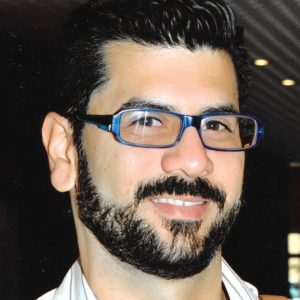
Yabanex BATISTA
Deputy Head of Fund Secretariat, Global Fund for Coral Reefs

Abhishek GOYAL
Senior Technical Director, Standards, Gold Standard

Nicolas PASCAL
Executive Director, Blue Finance
Nature-based Solution Champion
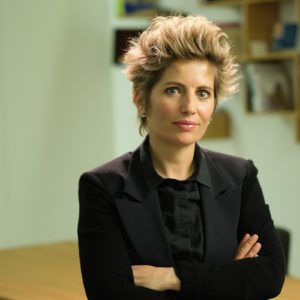
Gloria FLUXÀ
Vice-Chairman & CSO, Iberostar
Summary
The Context
Minna EPPS | Director, Global Marine and Polar Programme, IUCN
- Nature-based solutions have the potential to address societal challenges and IUCN has developed guidelines on how to implement NbS and share best practices.
- The Marseille Manifesto integrated NbS into three themes: Countering the impacts of COVID-19, halting biodiversity loss and confronting the risks and impacts of the climate emergency
The Co-Hosts of the UN Conference on the Ocean
Helena VIEIRA | Director General of Maritime Policy, Ministry of the Sea, Portugal
- Portugal advocates for NbS and the conservation and sustainable use of the ocean internationally such as in the 2030 Agenda, the Post-2020 Global Biodiversity Framework and is co-organizing with Kenya the UN Ocean Conference on 27 June – 1 July 2022 in Lisbon.
- Portugal is one of the leading countries in developing national ocean-related strategies and integrated a key principle that without a healthy ocean, none of the economic, environmental and societal actions can occur.
- Portugal has also designed an action plan on how to implement its national strategic goals and identified that nature-based solutions have an important contribution to fight climate change and pollution and restore ocean ecosystems.
- Portugal has a specific target to protect 30% of its coastal area by 2030; mapping coastal and marine habitats, including their ecosystem services and conservation status. Many of the interventions integrate NbS.
- Restoring nature and ecosystems has an economic imperative considering that many of the activities require a healthy ocean. It requires efficient use of marine resources targeting their sustainability and lifecycle management.
H.E. Amb. Cleopa MAILU | Permanent Representative of Kenya to the UN and other International Organizations in Geneva
- Nature-based solutions are critical for a green recovery and shared prosperity. The ocean is negatively impacted by human actions, further threatening food security, water supplies and biodiversity.
- The delivery of the 2030 Agenda is heavily reliant on the ocean, seas and marine resources. The current UN Ocean Decade (2021-2030) is taking place in a dynamic world with advanced technologies as well as the COVID-19 pandemic. It is an opportunity to transform and design scientific knowledge into actionable solutions.
- Kenya continues to highlight the importance of a sustainable blue economy in achieving the ocean we want by 2030 – efforts to revive ocean health and create sustainable conditions for the ocean, seas and coasts are urgently needed.
- In Africa, synergies are being drawn from frameworks highlighting the aspirations of the African people for the ocean. Kenya is at the forefront such as co-hosting with Japan and Canada the first Global and Sustainable Blue Economy and co-hosting with Portugal the UN Ocean Conference in 2022.
- Kenya was among the first countries to endorse the UN Ocean Decade and developed several initiatives through the Kenya Marine and Fisheries Research Institute. Kenya has finalized plans to develop its marine spatial plan in line with the recommendations of the 2020 High Level Panel for a Sustainable Ocean Economy, including the first mangrove blue carbon project in the world to protect mangroves and capture carbon from the atmosphere. The area of the project is now financially benefiting from carbon credits. The Kenya Go Blue Initiative also supports the protection of the country’s coasts and blue economy while creating environmentally friendly jobs and industries.
- The massive decline of coral reefs posed by the 1.5C warming causes danger to Kenya’s marine ecosystem and the maritime sector such as reduced tourism and coastal protection that may lead to poverty, loss of livelihoods, property damage and erosion. Kenya has enacted measures to promote better fishing practices that are less harmful to coral reefs. The marine parks are also committed to protect coral reefs in communities with larger stocks of fish.
- Kenya is second after Seychelles in the Indian Ocean region to protect coral reefs in stimulating the natural regeneration and recovery and restoring habitat complexity, which are being expanded to other degraded sites in the region.
- The Global Fund for Coral Reefs (GFCR) plays a critical role in conserving coral ecosystems which are under threat around the world. The Kenya-Tanzania transboundary area was among the first recipients of the Global Fund, which is being invested in profitable businesses and ecosystem projects to guarantee the resilience and conservation of marine biodiversity and adequate living conditions of local coastal communities. Ultimately, the Global Fund will prevent the extinction of coral reefs by eliminating the existing coral reef financing gap and supporting interventions for their best chance of survival.
- The world’s attention is called on to ensure that the balance between the ocean and human activities is implemented sooner than later. Kenya seeks to contribute to the transformational change that will put nature on the path to recovery by 2030 and achieve the 2050 vision of living in harmony with nature. Kenya intends to take lead and to continue with its activities to ensure the coastal line within its boundaries is preserved and regenerated to support the livelihoods of its people.
Developments and Opportunities on Integrating NbS into Coastal Marine Management
Arthur TUDA | Executive Secretary, Western Indian Ocean Marine Science Association (WIOMSA)
- For the past 30 years, WIOMSA has been supporting research initiatives on management, restoration and protection of marine coastal ecosystems in the Western Indian Ocean region.
- WIOMSA has funded more than 80 research programs in universities, research institutes and NGOs on areas such as fisheries, mangrove restoration, ocean governance and marine science research. WIOMSA also helps to identify gaps for the sustainable management of the ocean and supports marine science research by women and the youth. Recently, WIOMSA developed the most updated catalog of marine protected areas in the region and capacity building for 143 of them.
- WIOMSA supports the UN Ocean Decade with programs for science in sustainable ocean governance. Our strategic plan for the next five years focuses on restoration, marine spatial planning and ecosystems-based management of marine protected areas in the region. We also have programs looking at ocean acidification and marine litter monitoring programs.
Raphaëla LE GOUVELLO | Expert, IUCN CEM E-bAG & President, RespectOcean
- One of the aspects of NbS is to reconcile the blue economy with different sectors of activity and find the best solutions. In terms of fisheries and aquaculture, NbS could be considered for seafood production, especially with the negative environmental and social impacts associated with aquaculture.
- With the IUCN’s Ecosystem-based Aquaculture Group, we’ve been exploring how the negative consequences of aquaculture could be minimized by promoting an ecosystem approach and best-practices, including synergies with marine protection and coastal communities. At the recent IUCN Congress in Marseille, we presented case studies where aquaculture and marine protected areas could be part of a global economic strategy associated with other sectors such as fisheries and tourism.
- Solutions for a blue economy first have to be built locally and then used as a global standard on NbS, and an aquaculture-based system in coastal and marine areas could be part of NbS. With various criteria taken into account, we question how they can be addressed positively and bring opportunities to develop other aquaculture projects.
- We usually think of aquacultures in terms of food security and the local economy. But some aspects can also relate to climate mitigation, the restoration of marine habitats and social issues such as gender and women empowerment. For biodiversity gain, aquaculture can provide a new dimension through synergies between marine conservation and agricultural systems.
Yabanex BATISTA | Deputy Head of Fund Secretariat, Global Fund for Coral Reefs
- Coral reefs today have a value of USD 10 trillion annually, support 25% of all marine life on the planet, underpin key sectors such as tourism around the world and provide livelihoods for coastal communities. There are estimates that coral reefs support the employment of 1 billion people worldwide. But coral reefs are threatened, 90% are degraded and face extinction in the next 30 years.
- Current financing of coral reefs are seven times lower than what we need to ensure their future. The Global Fund for Coral Reefs is the first UN impact fund dedicated to SDG 14. It is designed as a blended finance vehicle to mobilize USD 625 million in the next 10 years for coral positive actions. We will invest in the most resilient reefs around the world to give them a chance for survival and reduce degradation to further increase resilience.
- We have a “demonstration fund” to highlight that we need to go beyond grant financing. If we don’t start partnering with the private sector and impact investors, we won’t achieve the amount of resources needed to save coral reefs. The grant activities we finance include feasibility studies, technical assistance, capacity building, monitoring and evaluation, which become the basis to create of positive reef businesses to absorb investments from the private sector.
- For NbS to thrive, we need policy commitment, science, financing and partnerships – coalitions for change. The coalitions should not only focus on UN and partner agencies but also to ensure that programs are being implemented on the ground.
Abhishek GOYAL | Senior Technical Director, Standards, Gold Standard
- The key principles the Gold Standard focuses on are projects that positively and holistically contribute to the SDGs and regularly monitor and report on their SDG outcomes. The impact of the projects should also be additional to what it would already generate and there are third-party auditors to ensure and certify that the projects have followed the guidelines.
- We work on multiple SDGs and provide the projects with tools to achieve their intended outcome. Certifications also ensure the stakeholders that projects are properly designed and implemented. For impact investors, standards and certifications provide confidence to investors that financial returns will be generated and are benefiting both people and planet.
Nicolas PASCAL | Executive Director, Blue Finance
- The Blue Finance co-manages with governments and local communities marine protected areas, for example, in Belize, the Dominican Republic, the Philippines and Fiji.
- We structure solutions for marine protected areas and work with those with capacities to generate revenue so they become financially sustainable in the future – bankable marine protected area.
- The Blue Finance also focuses on marine protected areas that can create social entrepreneurship and create blue economy sectors in and around the area to become financially sustainable. In doing so, we work with governments on preparing the co-management, agreements, public-private partnerships and roles and responsibilities.
- The four main activities on the field we implement are: Community engagement and development; nature and wildlife protection (including surveillance and compliance); science and monitoring, and; reliever management and regeneration of revenues, which should be reinvested back into the marine protected area.
- The five main income streams we develop are: Blue carbon, nature-based tourism, sustainable fisheries, aquaculture and micro-finance.
- The Blue Finance also manage blended financial solutions for marine protected areas. Once we have a long-term agreement with a government, a SMART business plan and implementation plan, an upfront capital from a blended financial solution is needed. We help create financial responsibility through accountability and responsibility from the local partners that the funds need to be paid back and reinvested into the marine protected area.
NbS Champion
Gloria FLUXÀ | Vice- Chairman and CSO, Iberostar
- Iberostar operates 100 hotels in 22 countries with 34,000 employees. Coming from the island of Mallorca, we are passionate about the ocean and 80% of our properties are by the ocean.
- Sustainability is a key strategic point in our business – responsible tourism and linking it to the oceans.
- By incorporating the IUCN NbS guidelines into our work, communities and client experience, we can evaluate how planting mangroves can compensate our carbon footprint.
- In 10 years, we would like to achieve a responsible tourism model and the reason why travelers would choose staying with us. I hope the private sector follows and create a new business model for the industry.
Conclusion
H.E. Amb. Cleopa MAILU
- It is important to encourage global partnerships and solidarity towards the achievement of SDG14, and therefore the support for sustainable financing, including the GFCR, will go a long way in helping communities and countries to address the challenge we are facing whether it is in the coral reefs or elsewhere.
- Kenya calls on international cooperation and solidarity in support of blue economy and in particular participation of member states in the UN Ocean Conference in 2022. Not only are we going to share experiences, but we should expect practical outcomes from that conference, which are going to help us in moving forward. Therefore we believe that conference will govern us international solidarity and bring more players and the different organizations, NGOs, civil society and all of us together to be able to input and gain momentum towards the achievement of SDG14.
- As a country, Kenya remains in the forefront, both at the local scene in helping our communities to regain the lost waters and the environment but also to advance them, not only in creating jobs but also to ensure that environment remains sustainable, the interaction between human and the oceans remains sustainable.
Helena VIEIRA
- There are examples of Nature-based Solutions applied recently by Portugal. A good example is around the Portuguese coast, a project called Biomares in the Arrábida-Espichel Marine Park. This project has the aim of restoring and managing biodiversity of this marine park including the restoration of seagrass meadows or prairies. What we’ve done in this project was to try to transplant sea grass from donor populations back to this place not just for the germination of seagrass seeds but also the posterior plantation, bearing in mind the genetic diversity. The sea grass restoration itself had some problems due to southern storms and intensive herbivorous population, but the project is important because it allowed to have a great deep knowledge about marine park management, sea grass distribution, population map, their life cycle, and an increased awareness of how this works.
- Another example, is with the seagrass meadows in the Sado river and in the Algarve regions in Ria Formosa, where a project called Ocean Alive is doing a big work . They have made a study that concluded that for each hectare of seagrass meadow that you planted, you remove 510 tons of nitrogen from the sea water. This project has reached over 21,000 students and volunteers, civil society and the public. Most importantly, it has actually had an impact on removing several hundreds of plastics from this and marine liter, and also engaged the female parts of the local fishing communities, also providing them with additional and diversified economic income.
- Bridging to Nicolas, Portugal has a new fund called Portugal Blue. It’s Portuguese public money from the Ministry of the Sea, together with EIF or the European Investment Fund. We are having 75 million euros more to sustainable blue economy projects in the next eight years. The goal of this fund is to actually help projects and some of them around Nature-based Solutions and marine ecosystem restoration and services protection.
Arthur TUDA
- The gaps in science are quite vast and many. To apply Nature-based Solutions, first of all we must all understand the interactions between nature, people and the whole dynamic of socioecological systems. That’s one of the areas that still needs to be understood quite broadly. We invest quite a bit of resources in promoting science that helps us to understand the connections between ecosystems and and people. Basically tying nature to resource users as well as to other aspects that link nature to humans.
- Restoration is a key aspect of Nature-based Solutions and the science of research restoring ecosystems is quite important. We have had success stories, we’ve also had failures in restoration programs and as we apply natural-based solutions, we need to expand our knowledge and how these systems, how such projects can be made more sustainable and and have successful results. In the decade that is ahead of us, we try to outline areas where we can support a lot of restoration work as well as build the scientific capacity for the region to be able to support some of the solutions that are being proposed.
- Science is going to be key to support Nature-based Solutions.
Raphaëla LE GOUVELLO
- We need good sciences to document, further investigate and explore Nature-based Solutions. At the moment there are European calls for research work and pushing towards Nature-based Solutions. Although the understanding of Nature-based Solutions according to the EU is a bit different perhaps from the global standard, there is plenty of space to explore more the concept and the tool provided through the global standard.
- In the case we had with Zanzibar, we explored Zanzibar seaweed farming as a potential Nature-based Solution. It’s an interesting case because most of this farming is made in the marine conservation area in Zanzibar. It’s also practiced by women, so it’s really important in terms of societal issues. Even with a candidate with very strong assets to say well this is a good Nature-based Solution which is aquaculture-based and included in a general blue economy strategy for Zanzibar, we found out through the global standard that there are some weaknesses that could be probably much enhanced through some work additional work by the communities, by the institutions, and also the scientific guidance as well. For instance you cannot develop seaweed farming without taking into account other species like sea grass and there are some potential negative impacts, whereas seaweeds can bring additional benefits to the ecosystems.
- On the whole economic viability of the system, the global standard brings up interesting questions about what kind of growth you want, what is inclusive, and is it very much depending on export markets? So where is the added value? Where is the the the general economic system that you want? We have a whole set of questions which belong to the sustainability assessment of nature-based systems but put in a glance with the global standard tool.
Abhishek GOYAL
- From the experience of carbon markets and the carbon finance, the world has seen the benefits of using third-party standards and certifications, and the role these play in mobilizing finance.
- We should definitely use these NbS standards with a third-party certification if we want more finance being mobilized for actions in the Oceans.
Yabanex BATISTA
- The standard for Nature-based Solutions is a tool that our funding sources really need to look into and take into account. When designing our programs, if we want our resources to be deployed effectively and create change, the NbS standard can help us achieve that.
- The private sector is willing to come to the table, they want to deploy resources, but they don’t feel the right conditions exist on the ground. That is what this fund (GFCR), with for example the work that blue finance also described is trying to achieve. We want to ensure that through the grant mechanisms we establish the enabling conditions. We paved the way for those investors to feel more secure and able to come in.
Nicolas PASCAL
- What we’re trying to reintroduce the role of ecosystems, changing from grey solutions to more green solutions. With Nature-based Solutions, we’re using nature to improve some of the ecosystem services, whether it is for ecotourism, for coastal protection, for carbon sink, or for fishery.
- Five years ago, no one was talking about blended finance. Five years ago, there was nothing about a core global focus trying to push private sector to invest in coral reef. No one was talking about investing in the marine protected area, so that’s a new concept. We have to go carefully, as not everything is good in private sector. We have the good, the bad and the ugly. We have to focus on the good.
Video
In addition to the live WebEx and Facebook transmissions, the video is also available on this webpage.
NbS and the Ocean
Fiji Investing in Coral Reefs and the Blue Economy, a Nature-based Solution
Documents
Links
The update on Nature-based Solutions provides relevant information and the most recent resources, news and articles from the various organizations in international Geneva and other institutions around the world.
- What are Nature-based Solutions (NbS)? | Infographic | IUCN
- IUCN Global Standard for Nature-based Solutions: First Edition | IUCN | 2020
- About the 2020 UN Ocean Conference | UN
- UN Decade of Ocean Science for Sustainable Development | UN
- Climate Change and the Ocean | IUCN Marine and Polar Programme
- Coastal and Marine Ecosystems as Nature-based Solutions in New or Updated Nationally Determined Contributions | Ocean & Climate Platform, Conservation International, IUCN, GIZ, Rare, The Nature Conservancy and WWF | 2021

